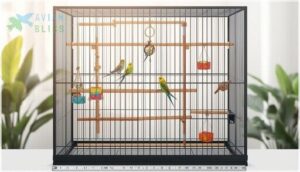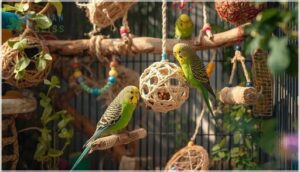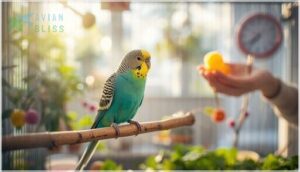This site is supported by our readers. We may earn a commission, at no cost to you, if you purchase through links.
Your budgie could live anywhere from 5 to 15 years depending on the care you provide—a span that represents roughly a tenth of your own life. That’s a significant commitment, yet many new budgie owners don’t realize how profoundly their daily decisions influence their bird’s longevity.
Genetics set the foundation, but nutrition, veterinary care, environmental conditions, and stress management determine whether your budgie reaches the lower or upper end of that range. Understanding the specific factors that shorten or extend budgie lifespan enables you to make informed choices about diet, housing, enrichment, and health monitoring.
Small adjustments in how you feed, house, and interact with your budgie can add years to their life while improving their overall quality of life.
Table Of Contents
- Key Takeaways
- What is The Average Budgie Lifespan?
- Factors That Affect Budgie Lifespan
- Budgie Lifespan: Wild Vs. Captivity
- Do Male or Female Budgies Live Longer?
- Signs of Aging in Budgies
- Common Causes of Budgie Death
- How Diet Influences Budgie Longevity
- Importance of Exercise and Enrichment
- Creating a Lifespan-Boosting Budgie Habitat
- Tips to Extend Your Budgie’s Life
- Frequently Asked Questions (FAQs)
- How long do budgerigars live?
- How to identify if a budgie is less than 18 days old?
- How long do budgies live?
- How old is a budgie if he dies?
- How old is the oldest Budgie?
- What factors affect Budgie lifespan?
- How old do budgies get?
- Can budgies live alone?
- How long do budgies live as a pet?
- How do you know if a budgie is happy?
- Conclusion
Key Takeaways
- Your budgie’s lifespan ranges from 5 to 15 years depending on the quality of care you provide, with captive birds living significantly longer than wild budgies who face predation, disease, and environmental extremes that typically limit survival to 3-8 years.
- Daily nutrition choices directly impact longevity—balanced pellet-based diets with fresh vegetables, cuttlebone for calcium, and strict avoidance of toxic foods like avocado, chocolate, and onions can add years to your bird’s life while preventing common deficiencies.
- Chronic stress from noise pollution, temperature swings beyond 5°C in 24 hours, or poor social enrichment weakens immunity and shortens lifespan, making environmental management and daily interaction as critical as physical health monitoring.
- Annual veterinary checkups catch diseases like psittacosis or tumors early, while daily cage sanitation, 3-4 hours of supervised flight exercise, and rotating mental enrichment toys prevent the accidents, infections, and behavioral issues that commonly cause premature death.
What is The Average Budgie Lifespan?
Your budgie’s lifespan depends largely on whether they’re living in your home or surviving in the wild. Pet budgies usually enjoy a much longer life than their wild counterparts, though individual results vary based on care quality and genetics.
Let’s break down what you can realistically expect in different environments and look at some extraordinary longevity records.
Typical Lifespan Range in Captivity
Your captive budgie will generally live 5 to 10 years with standard care. Under ideal conditions—balanced nutrition, regular veterinary checkups, and enriched environments—some pet budgies reach 12 to 15 years. Records even show individuals living into their late teens when bird care standards are outstanding.
Pet longevity depends heavily on your dedication to budgie health and wellness throughout their aging years. To guarantee the best care, it’s vital to follow clear writing guides for research on bird health.
Lifespan Range in The Wild
Wild budgies face a tougher road. In their native Australian habitat, most survive just 3 to 8 years. Predators, disease, and scarce resources drive mortality factors that captivity eliminates. Food availability fluctuates with seasonal rains, and habitat quality varies drastically across regions.
Wild budgie habitat simply doesn’t offer the safety net your home provides.
- Predation pressure from raptors and ground hunters shortens wild lifespan
- Disease exposure spreads rapidly through dense flocks
- Environmental extremes—droughts and heat—strain survival rates
Understanding methodological rigor is vital for evaluating the accuracy of lifespan studies.
Record-Setting Oldest Budgies
While most budgies reach 10 to 15 years, longevity records push boundaries further. Documented cases show budgies aging into their late teens, with standout individuals reaching around 20 years under ideal senior care.
Aging factors like beak health and feather quality signal these elderly budgies’ striking resilience. Animal longevity experts attribute such records to careful budgie health and wellness practices—proof that dedication lengthens aging budgies’ lives notably.
Factors That Affect Budgie Lifespan
Your budgie’s lifespan isn’t set in stone—it’s shaped by the daily choices you make as an owner. Some factors you can control completely, while others require awareness and proactive management.
Your budgie’s lifespan isn’t predetermined—it’s built through the daily care choices you control and the risks you actively manage
Understanding these key influences helps you create the conditions your bird needs to thrive for years to come.
Genetics and Breeding
Your budgie’s longevity starts before they hatch—genetics plays a powerful role. Mitochondrial health and inherited traits determine metabolic efficiency and disease resistance. When you choose a budgie, consider:
- Genetic diversity in the breeding line reduces inherited disorders
- Inbreeding depression weakens vitality and shortens lifespan
- Color mutations may carry hidden recessive genes affecting longevity
- Wild-type gene pools offer greater environmental resilience
- Responsible breeding methods prioritize health over appearance alone
Nutrition and Diet Quality
What you feed your budgie shapes their longevity more than you might realize. Balanced diets built on high-quality pellets or fortified seed mixes provide essential vitamins and minerals that strengthen immune function and extend budgie lifespan.
Fresh foods like vegetables and fruits add fiber and hydration, while nutrient supplements such as cuttlebone deliver calcium for bone health. Dietary variety prevents deficiencies, and choosing healthy treats over fatty options protects against obesity—a common threat to pet bird nutrition and overall avian health.
Veterinary Care and Disease Prevention
Annually, you’ll want to schedule preventive health checkups with an avian veterinarian to monitor your budgie’s weight, feathers, and respiratory function. Early disease diagnosis catches illnesses like psittacosis or parasite infestations before they shorten budgie lifespan.
Your vet will tailor vaccine schedules and parasite control strategies to your region, strengthening bird health and wellness through proactive avian medicine rather than reactive crisis care.
Environmental Conditions and Stress
Chronic noise pollution drives your budgie’s stress hormones up by 2.5-fold, weakening immunity and shortening lifespan. Temperature control matters—sudden swings beyond 5°C in 24 hours trigger harmful physiological responses.
Proper cage ventilation reduces respiratory infections, while social enrichment and stress management through companionship or interactive toys safeguard avian health, supporting animal aging gracefully and promoting long-term bird wellness.
Budgie Lifespan: Wild Vs. Captivity
Where your budgie lives makes all the difference in how long they survive. Wild budgies face dangers that captive birds never encounter, while pet budgies benefit from protections their wild cousins can only dream of.
Understanding these contrasts helps you appreciate what your bird needs to thrive.
Survival Challenges in The Wild
In the wild, your budgerigar faces relentless survival pressures that dramatically shorten its lifespan. Wild predators—raptors, snakes, and mammals—target fledglings and weakened adults. Habitat loss from agriculture eliminates nesting sites, while extreme weather and food scarcity during droughts exhaust energy reserves. Disease outbreaks spread unchecked without veterinary care, compounding mortality in wildlife conservation contexts where avian ecology prioritizes population dynamics over individual longevity.
| Threat Category | Primary Risk Factors | Impact on Lifespan |
|---|---|---|
| Predation | Raptors, snakes, mammals | High fledgling/senior mortality |
| Environmental | Drought, storms, heat waves | Energy depletion, reduced body condition |
| Disease | Avian bornavirus, parasites | Rapid spread, no treatment access |
| Habitat | Deforestation, agriculture | Loss of food sources, nesting sites |
Advantages of Captive Care
Captive budgies thrive under conditions you can control—veterinary care catches diseases early, predator protection eliminates constant survival threats, and diet formulation delivers precise nutrition wild flocks never access. Your avian pet ownership creates predictable social enrichment through daily interaction, while routine health screenings prevent infections that devastate free-ranging populations.
| Captive Health Advantage | Wild Limitation | Lifespan Impact |
|---|---|---|
| Veterinary Care | No medical intervention | +5–10 years |
| Diet Formulation | Seasonal food scarcity | Prevents malnutrition |
| Predator Protection | Constant predation risk | Eliminates early mortality |
| Social Enrichment | Unpredictable flock dynamics | Reduces stress-related illness |
Do Male or Female Budgies Live Longer?
You might wonder whether male or female budgies tend to live longer, especially if you’re choosing a new pet. The truth is that sex differences in lifespan aren’t as straightforward as many bird owners assume.
Let’s look at what research and real-world observations tell us about how gender affects longevity in budgies.
Lifespan Differences by Sex
You might wonder if your male or female budgie will live longer—the truth is, sex-based mortality patterns show subtle differences. Male budgies generally reach 7–10 years in captivity, while females average 6–9 years, reflecting overlapping ranges with modest gender health differences.
Lifespan genetics and reproductive costs, particularly nesting demands in females, contribute to these sex-influenced longevity trends. Your pet budgie’s lifetime depends on multiple factors beyond sex alone.
Research and Observational Insights
Longevity studies reveal modest sex differences in budgie lifespan, with inconsistent results across populations.
Observational datasets emphasize individual health history over sex as a predictor—your bird’s genetics, veterinary care, and diet matter far more.
Aging patterns and mortality rates overlap substantially between males and females in well-managed environments, so you’ll extend your budgie’s life through attentive care rather than gender-based strategies.
Signs of Aging in Budgies
As your budgie enters its senior years, you’ll start noticing subtle shifts in both behavior and appearance. These changes happen gradually, so it’s easy to miss them if you’re not paying attention.
Recognizing the signs of aging helps you adjust care and keep your bird comfortable through its golden years.
Behavioral Changes With Age
As senior budgies age, you’ll notice subtle shifts in their daily rhythms. Activity levels drop—your bird may prefer perching to playing, with shorter flights and less energetic wing fluttering. Vocal changes become evident; chirps grow softer or less varied, signaling cognitive decline and social withdrawal. Watch for these aging symptoms:
- Longer, more frequent naps throughout the day
- Reduced interaction with toys or cage mates
- Slower responses to new routines or enrichment
- Steadier, smaller meals with changing food preferences
Physical Symptoms of Senior Budgies
Beyond behavior, your budgie’s body reveals physical symptoms of aging. Beak changes include overgrowth or flaking, while feather loss and dull plumage signal declining keratin production. Eye problems—cloudiness or reduced pupil response—often accompany organ aging.
Mobility issues like wingtip droop or reluctant climbing point to arthritis. Vocalization decline continues as respiratory capacity weakens.
These senior budgies need adapted perches and gentler handling to maintain comfort through their golden years.
Common Causes of Budgie Death
Understanding what commonly shortens a budgie’s life helps you protect your bird from preventable risks. Most budgie deaths result from a combination of disease, environmental dangers, and exposure to harmful substances.
Let’s look at the three main categories that put your budgie at risk.
Illnesses and Diseases
Respiratory issues and bacterial infections—like psittacosis—can strike suddenly, causing nasal discharge, lethargy, and even death if you don’t catch them early. Viral diseases such as polyomavirus devastate chicks, while fungal conditions like avian gastric yeast quietly steal nutrients despite your bird eating normally.
Neoplastic disorders, especially kidney tumors, peak between three and six years of age. Regular avian health and veterinary care safeguards your budgie’s welfare and longevity.
Accidents and Environmental Hazards
Even with careful bird welfare practices, household dangers lurk everywhere—your budgie can collide with windows, drown in open containers, or chew electrical cords. Accident proofing demands vigilance:
- Toxic exposure prevention: Remove non-stick cookware, aerosols, and plants like pothos that threaten avian health and veterinary care efforts.
- Safe handling protocols: Close doors and windows before flight time.
- Environmental risks assessment: Inspect cages for sharp edges or gaps.
Impact of Stress and Toxins
Chronic exposure to airborne cleaners, smoke, or heavy metals silently devastates your budgie’s resilience. Stress management and toxin exposure together accelerate disease onset. Behavioral changes like feather-plucking or withdrawal signal underlying distress, demanding immediate health monitoring and environmental risk assessment to safeguard avian health, veterinary care outcomes, animal longevity, and overall pet bird care success.
| Stressor/Toxin | Impact on Bird Behavior and Psychology |
|---|---|
| Cigarette smoke | Respiratory failure, reduced vocalization |
| Heavy metals (zinc) | Neurologic deficits, GI distress |
| Aerosol cleaners | Acute respiratory irritation |
| Loud disturbances | Elevated heart rate, hiding behaviors |
| Poor water quality | Elevated stress hormones, appetite loss |
How Diet Influences Budgie Longevity
What you feed your budgie directly impacts how long they’ll live. A balanced diet prevents common deficiencies and keeps their immune system strong, while poor nutrition opens the door to disease and early death.
Let’s break down the nutrients your budgie needs and the foods that could shorten their life.
Essential Nutrients for Budgies
Your budgie’s diet and nutrition form the foundation of longevity—think of nutrient balance as preventive medicine. High-quality pellets provide essential amino acids and vitamin supplements, while fresh foods deliver antioxidants and fiber.
Mineral intake matters: cuttlebone supplies calcium and vitamin D3 for strong bones. Incorporate seed alternatives and prioritize avian nutrition principles.
Proper pet bird nutrition and diet practices, especially a varied budgie diet, directly support immune function and overall health.
Foods to Avoid
Protecting your budgie from toxic foods is as critical as offering the right ones—avian nutrition and diet demand vigilance. Certain human snacks and fresh fruits pose real threats, causing nutrient deficits or worse.
Foods requiring strict avoidance include:
- Avocado flesh, pit, and skin contain persin, which can trigger cardiac and respiratory distress in budgies.
- Chocolate, caffeine, and alcohol are highly toxic, causing severe neurological and metabolic damage.
- Onions, garlic, and apple seeds damage red blood cells or release cyanide compounds when ingested.
Seed allergies are rare, but contaminated or moldy seeds harbor mycotoxins. Proper budgie care and pet bird nutrition and diet practices mean scrutinizing every treat—your bird’s longevity depends on what you exclude, not just what you provide.
Importance of Exercise and Enrichment
Your budgie’s physical and mental well-being depends on more than just food and water. Exercise keeps muscles strong and hearts healthy, while mental challenges prevent boredom and behavioral problems that can shorten lifespan.
Here’s what your budgie needs to thrive beyond basic care.
Physical Activity Needs
Your budgie’s cardiovascular health depends on 3–4 hours of aerobic exercise daily—think of it as their version of a morning run. Supervised flight sessions in a bird-proofed room, combined with climbing and foraging activities, deliver the physical stimulation essential for pet budgie longevity. Daily movement fosters both bird behavior and overall vitality.
| Activity Type | Duration | Health Benefit |
|---|---|---|
| Free flight | 30–60 minutes | Cardiorespiratory fitness |
| Climbing/foraging | 2–3 hours | Muscle tone, joint health |
| Social interaction | Throughout day | Mental and physical engagement |
Exercise routines should adapt to your bird’s age and health status, ensuring environmental design fosters natural movement patterns without overexertion.
Mental Stimulation and Toys
Think of your bird’s brain as a muscle that needs a daily workout. Puzzle feeders and toys rotation—swapping subsets every 5–7 days—keep your pet budgie engaged and reduce repetitive bird behavior.
Interactive foraging toys boost activity by 60%, while chewable wood aids beak maintenance.
Cognitive games and social enrichment transform bird care into a partnership that strengthens exercise and stimulation, extending lifespan through meaningful mental engagement.
Social Interaction Requirements
Beyond toys and puzzles, your budgie craves genuine social bonding. At least two hours of daily human interaction prevents feather plucking and anxiety. Whether you’re talking softly, offering training sessions, or simply sharing space, consistent engagement teaches bird communication and builds trust.
Pairing your pet with a compatible companion can also fulfill social interaction requirements, supporting environmental enrichment and natural budgie social behavior that extends lifespan.
Creating a Lifespan-Boosting Budgie Habitat
Your budgie’s home isn’t just a cage—it’s the foundation of their health and longevity. A well-designed habitat reduces stress, prevents accidents, and fosters both physical and mental well-being throughout their life.
Three core elements determine whether your setup truly extends lifespan or quietly undermines it.
Cage Size and Setup
Your budgie’s cage isn’t just housing—it’s their world. You’ll need at least 18 inches in each dimension to allow proper flight space. Bar spacing shouldn’t exceed 1/2 inch to prevent escapes or injuries.
Cage depth matters for movement, while horizontal bars encourage climbing.
Add perch variety at different heights with varying textures, and strategically place toys to spark natural foraging behaviors in pet budgies.
Cleanliness and Safety
Daily cage sanitation directly impacts your budgie’s respiratory health and disease resistance. You’ll want to remove droppings and uneaten food every day, then deep-clean weekly with bird-safe cleaners—vinegar solutions work well.
Your bird hygiene checklist:
- Wash water dishes daily to prevent bacterial buildup
- Inspect safe toys weekly for wear that could cause ingestion hazards
- Keep emergency kits stocked with avian first-aid supplies
Air quality matters as much as cleanliness itself.
Environmental Enrichment
Enrichment Activities transform your budgie’s cage from a holding space into a stimulating habitat. Rotate at least three toy types daily to encourage natural foraging tips and exploratory behaviors. Foraging puzzles boost problem-solving skills, while varied perches support physical conditioning.
Social bonding through supervised interaction—whether with other birds or you—reduces stress markedly.
Regular cage design updates with non-toxic materials keep Pet Bird Socialization and Interaction fresh, directly supporting longevity through mental engagement.
Tips to Extend Your Budgie’s Life
You’ve built the right habitat and learned what budgies need to thrive—now it’s time to put those insights into daily action. Small, consistent habits make the biggest difference regarding longevity.
Here are three practical strategies that can help your budgie live a longer, healthier life.
Routine Health Checks
Your budgie’s health depends on consistent monitoring—schedule veterinary visits at least once a year for pet budgies. During checkups, your avian vet will assess weight, feather inspections, beak care, and internal function.
Monthly weigh-ins and diet reviews at home help you catch early warning signs. Health monitoring isn’t optional; it’s how you safeguard your bird’s future and extend those precious years together.
Stress Reduction Strategies
Minimizing stress keeps your budgie healthy and extends lifespan. Create a calm environment by placing the cage away from loud appliances and sudden noise reduction.
Social bonding through gentle handling and daily interaction strengthens trust, while relaxation techniques like soft music help anxious avian pets.
Pet budgies thrive when they feel secure, so avoid abrupt movements and maintain consistent routines in your bird care practices.
Daily Care Best Practices
Consistency matters more than you might think in budgie care and maintenance. Clean your bird’s cage daily and disinfect it weekly with pet-safe products. Offer fresh water and balanced avian nutrition each morning—quality pellets, limited seeds, and vegetables.
Schedule annual veterinary visits to catch issues early. Control temperature, humidity, and lighting while ensuring daily social interaction through supervised flight time and gentle handling.
Frequently Asked Questions (FAQs)
How long do budgerigars live?
Most pet budgerigars live 7 to 10 years with proper care, though some reach 12 to 15 years under ideal conditions. Wild budgerigars typically survive only 4 to 7 years due to predation and environmental challenges.
How to identify if a budgie is less than 18 days old?
You might wonder why age matters—it’s vital for proper care. Budgie chicks under 18 days have closed eyes, no feathers, soft pinkish beaks, and minimal vocalization patterns, relying entirely on nest support and parental feeding.
How long do budgies live?
Budgerigars generally live 5 to 8 years in captivity, though many reach 7 to 10 years with proper care. Wild budgies face shorter lifespans—around 4 to 6 years—due to predation and environmental challenges.
How old is a budgie if he dies?
Most budgies die between 5 and 8 years old in typical homes.
With outstanding care—quality nutrition, veterinary attention, stress reduction—some reach 10 to 15 years, though mortality rates increase sharply beyond that range.
How old is the oldest Budgie?
The oldest budgie on record lived around 29 years—a remarkable outlier. Most reliable veterinary reports document notable individuals reaching 14 to 15 years, showcasing maximum lifespan achievement through superior senior budgie care.
What factors affect Budgie lifespan?
You can’t blame fate alone when your pet bird clocks out early. Genetic Factors, Nutrition Quality, Environmental Stress, Health Monitoring, and Social Interaction all shape your budgie’s lifespan—so Budgie Care and Management truly matters.
How old do budgies get?
Most pet budgies reach 5 to 10 years with standard care. Under ideal conditions—excellent diet, regular veterinary visits, enrichment—some individuals live 12 to 15 years, with rare cases approaching
Can budgies live alone?
While budgies can survive solo with dedicated human interaction, they’re inherently social creatures. Single pet budgies may develop lonely behavior like feather-plucking without daily enrichment, though bird companions better fulfill their natural flock instincts.
How long do budgies live as a pet?
With ideal pet care and attention to avian nutrition, your feathered companion generally thrives between 5 and 10 years, though rare individuals occasionally reach 12 to 15 years through excellent pet bird wellness practices.
How do you know if a budgie is happy?
A happy budgie greets you with radiant, clear eyes, smooth plumage, and joyful chirps.
Watch for playful toy exploration, gentle head-bobbing, and keen social interaction—these vocal cues and behaviors reveal your bird’s contentment.
Conclusion
Think of your budgie’s years as delicate seeds you’re cultivating—each requiring patience, attention, and deliberate care. The difference between a brief five-year companionship and a full fifteen-year bond often comes down to choices you make daily.
Your budgie’s lifespan isn’t predetermined; it’s shaped by nutrition, environment, and vigilance. Small investments in quality care compound over time, transforming survival into thriving.
The clock starts now—make each year count.
- https://x.com/godofprompt/status/1990526288063324577
- https://www.linkedin.com/posts/bohdanlukianets_tasks-study-research-activity-7373377539521667072-UTEi
- https://fidarfeed.com/pet/pet-bird/top-deadly-budgerigar-diseases-and-how-to-prevent-them/
- http://www.exoticpetvet.com/polyoma-virus.html
- https://www.merckvetmanual.com/bird-owners/disorders-and-diseases-of-birds/disorders-affecting-multiple-body-systems-of-pet-birds















